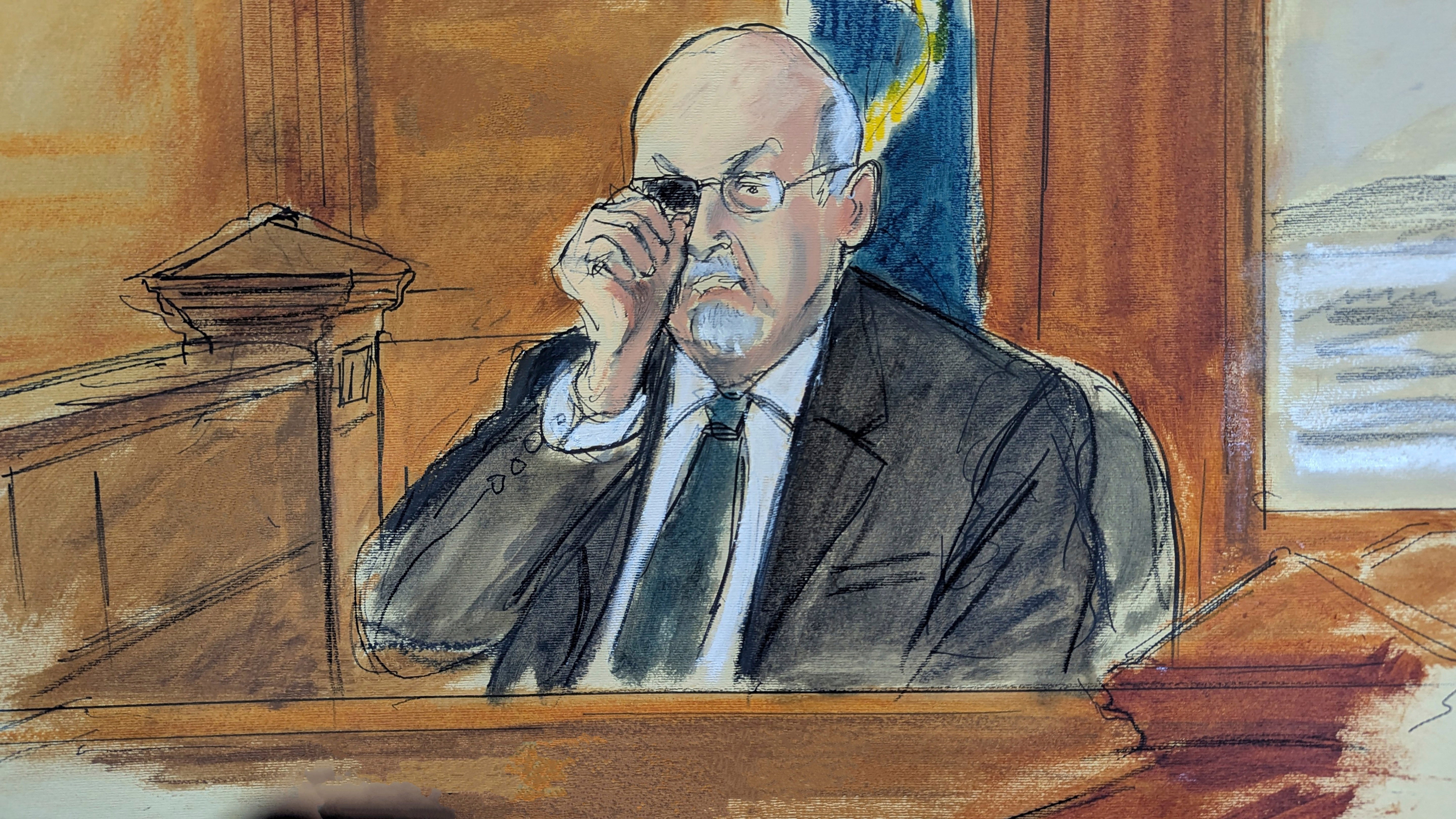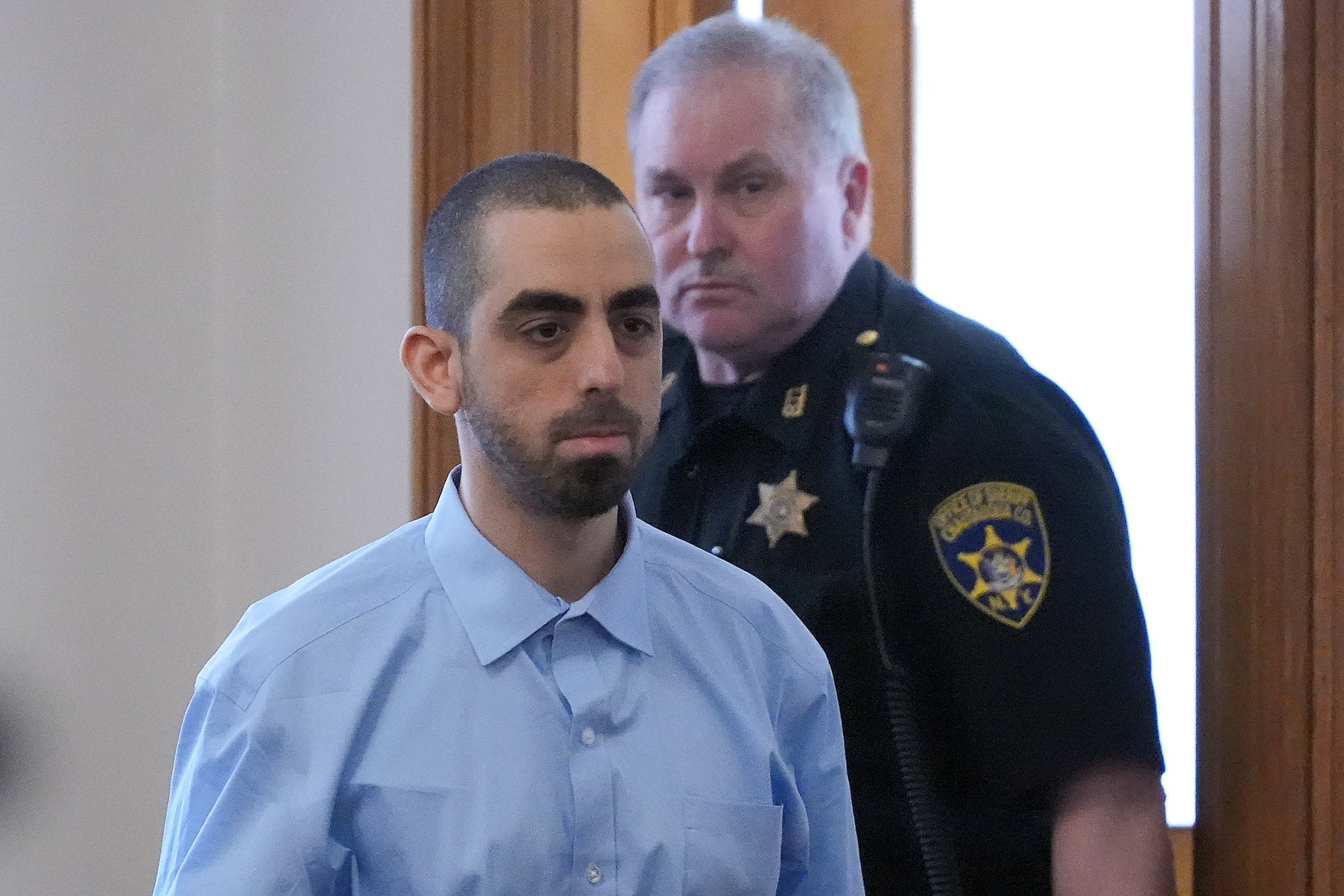Salman Rushdie took the stand on Tuesday morning in the trial of the man accused of trying to kill him and revealed how he believed he was about to die just after the harrowing knife attack.
The celebrated Indian-born British-American author has faced death threats since his 1988 novel The Satanic Verses was declared blasphemous by Iran’s then-supreme leader Ayatollah Ruhollah Khomeini. On 12 August 2022, he was stabbed more than a dozen times in a frenzied knife attack, in front of a lecture audience at Chautauqua Institution Amphitheater, an assault that left him blind in one eye.
“I became aware of a great quantity of blood I was lying in,” he told the court, recalling lying on the stage. “My sense of time was quite cloudy, I was in pain from my eye and hand, and it occurred to me quite clearly I was dying.”
For the first time in two years, Rushdie, now 77, faced his alleged stabber in a New York courtroom. Hadi Matar, 27, from New Jersey, has pleaded not guilty to charges of attempted murder and assault. Matar intently scribbled on a yellow legal pad at the defense table while Rushdie avoided looking in his direction as he described how the attack unfolded.
“I was aware of this person rushing at me from my right-hand side. I was aware of someone in dark clothes … I was struck by his eyes which seemed dark and ferocious to me,” he testified.
“He hit me very hard around my jawline and neck. Initially, I thought he’d punched me with his fist, but very soon afterward I saw blood on my clothes.”

Rushdie was stabbed in the neck, stomach, chest, hand, and right eye, leaving him partially blind and with permanent damage to one hand.
“Everything happened very quickly. I was stabbed repeatedly, and most painfully in my eye. I struggled to get away. I held up my hand in self-defense and was stabbed through that.”
Rushdie said that the knife severed all the tendons in his hand, and is not “fully repaired.”
When he was asked how many times he was stabbed, Rushdie answered: “I wasn’t keeping score.”
Rushdie said he first thought his knife-wielding attacker was striking him with a fist.
“But I saw a large quantity of blood pouring onto my clothes,” he said. “He was hitting me repeatedly. Hitting and slashing.”
Rushdie said he was struck again in his chest and torso and stabbed in his chest as he struggled to get away.
“He was trying to strike me as many times as possible,” he testified, estimating that he had been struck 50 times by his assailant. “I was very badly injured and I couldn’t stand up anymore.”
Rushdie then removed his glasses and showed jurors “what’s left” of his eye, which is now a sewn-up eye socket beneath an eye patch, and said: “I was screaming because of the pain.”
“You can see that’s what’s left of it, there’s no vision in the eye at all,” he continued. “It was a stab wound in my eye and intensely painful and after that I was screaming because of the pain and I couldn’t see out the eye.”
Rushdie then explained to the court about the other injuries he suffered in the attack.
“There’s a scar visible on the left-hand side here, slash wound here,” he said as he ran his fingers from the left-hand side of his mouth.
“Two major injuries the one to my neck, the one to my left-hand side… and the one across... From left to right across my neck, that’s what I recall… that was a slash wound.”
He used his hand in a stabbing motion to show the court that there were “three like puncture wounds down the middle of my chest.”
Henry Reese, the moderator of the event, “ran across the stage and tackled the individual, and after that a number of members of the audience… also came up on stage to help,” he recalled.
”I was lying on the ground in pain… I was aware of a small pile of people to my right essentially subduing the attacker and thanks to that I guess I survived.”
Rushdie was then flown via helicopter to a trauma unit at a hospital in Pennsylvania where he was put on a ventilator for 24 hours as it “was not clear that I could breathe without it”, he said.
He was at the trauma hospital for 17 days as the “injuries were very serious and it took a long time to recover from” like the gash on his face that he said was “so bad that it had to be held together by metal staples.”
“I also had lost an enormous amount of blood that left me extremely weak”, he added.
“I think I’m not quite at 100 per cent. I think I’ve substantially recovered but it’s probably 75 to 80 percent,” Rushdie testified. “I’m not as energetic as I used to be. I’m not as physically strong as I used to be.”
During cross-examination, assistant public defender Lynn Schaffer probed Rushdie about how long his sense of time had been “cloudy” after the attack and whether trauma has an “impact on the way we remember things.”
Rushdie said he had “some false memories”, which included a “false memory that when I saw the attacker I stood up to face him… that was not true”.
When asked if he felt the 15 strikes, he said: “I wasn’t counting at the time, as I said, but afterward I could see them on my body, I didn’t need to be told by anybody.”

The author’s testimony comes a day after the trial began with opening statements, during which the court heard how Rushdie was stabbed repeatedly in the frenzied assault by an attacker who came “dangerously close to committing murder.”
District Attorney Jason Schmidt told the jury that Matar approached the stage and, “without hesitation upon reaching Mr Rushdie, this man very deliberately, forcefully and efficiently with speed plunged the knife into Mr Rushdie over and over and over and over again.”
Schmidt said that Matar “almost succeeded in killing Mr Rushdie” and that during the trial, they would use Matar’s “own words” to help prove his intent beyond reasonable doubt.
Matar’s defense attorney Schaffer told the jury in her opening statement that prosecutors couldn’t prove Matar’s guilt, even with videos and photos. She said the case is not as straightforward as the prosecution portrayed.
Two witnesses testified on Monday, including Chautauqua Institute former director of education Jordan Steves, who attempted to disrupt the attack by tackling the assailant.
The trial is expected to last a week to 10 days. Matar faces up to 25 years in prison if convicted.







